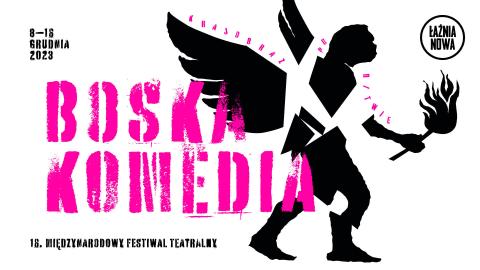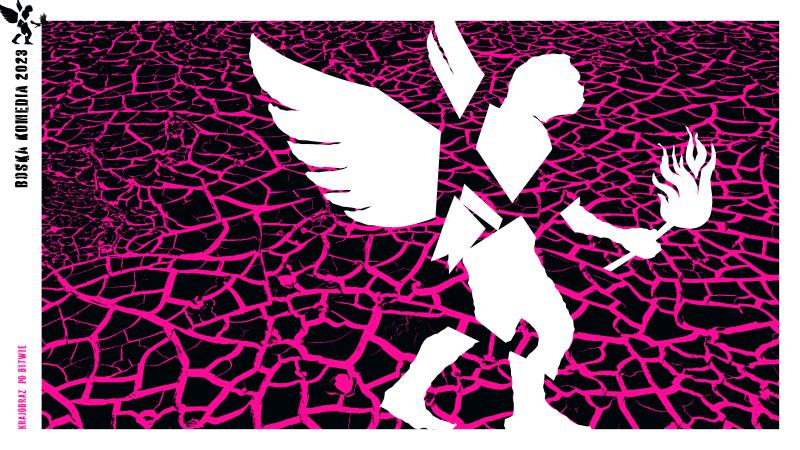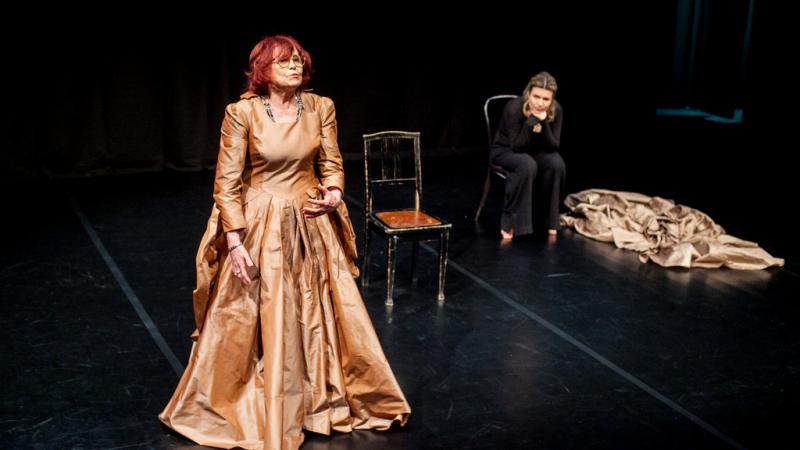13:28
The 16th edition of the Divine Comedy International Theatre Festival in Krakow is 9 days of strong artistic impressions, a real dialogue between creators of different generations, origins and worldviews. These are over 20 performances from Poland and abroad, including 7 in the INFERNO main competition, selected by a 5-person group of selectors. The winner will take with them the Divine Comedian statuette, and the selection will be made by a jury composed of critics, curators and festival selectors from 6 countries: USA, Chile, Turkey, India, Italy and Switzerland. The festival will take place from December 8 to 16. Ticket sales start on November 8 at 12 on the website bilety.boskakomedia.pl.
This year’s Divine Comedy is held under the slogan “Landscape After the Battle”. Recent years have been a time of countless and constant Polish battles – for free courts and free media, for women’s rights, for minority rights, and for the independence of cultural institutions. These battles took place in parliamentary benches, in churches, in front of courts, and also on the streets. They also took place on stages, because the theater, like a lens, reflects the state of contemporary society. We are coming out of this war extremely tired, battered and polarized as a community. We are fed up with the radicalization of the language of public debate and the devastating tension we have been living in for a long time. The performances shown at the Divine Comedy reflect this “landscape after the battle” and may not analyze the causes that led to it, but they are a testimony of the times and strategies of survival in the country of the cultural war unleashed by ideologized politicians. In each of them we can find a perspective of overcoming, a path to hearts, understanding and hope that illuminates the darkness.
The competition’s “The Well–Behaved Young Man” by Wiktor Rubin and Jolanta Janiczak from the Nowy Theatre in Łódź and “Spartacus” by Jakub Skrzywanek from the Contemporary Theatre in Szczecin, shown outside the competition, are about the refusal to accept exclusions from the point of view of the excluded, the rebellion against hate speech and the lack of tolerance towards differences. “Once Upon a Long Day” by Luk Perceval from the National Stary Theatre in Krakow and “Melodrama” by Anna Smolar from the Powszechny Theatre in Warsaw talk about a dysfunctional, violent family and relationships devoid of feelings, and about sliding into the hell of addiction. “Anxiety Comes at Dusk” by Małgorzata Wdowik from the Wrocław Mime Theatre tells the story of the loss of bonds and fear experienced by young people. Mateusz Pakuła shouts about the trauma of losing a parent, the callousness of the church and the ossification of the health care system in “How I Didn’t Kill My Father and How Much I Regret It” from Łaźnia Nowa in Krakow and the Żeromski Theatre in Kielce, emphasizing that an anarchist sense of humor can be an escape from despair. Breaking the dark tones is also brought by “1989” by Katarzyna Szyngiera from the Słowacki Theatre in Krakow, where the positive myth of “Solidarity” becomes the beginning of a new myth that – hopefully – we will all build, as well as a way to show the unity of the team with the director subjected to persecution by the authorities.
From year to year, from edition to edition, the Divine Comedy speaks more and more with the voice of women. This is the manifesto of sisterhood and women’s right to decide about themselves, i.e. “My Brilliant Friend” by Ewelina Marciniak of the National Stary Theatre in Krakow, and – in a different trend – disarming stereotypes and false hierarchies, also perpetuated in the theatre environment, “Very Funny” by Patrycja Kowańska and Dominika Knapik. Their strong personal voice also enters into a polemic with “A Midsummer Night’s Dream” by Jan Klata from the Nowy Theater in Poznań, which sharply ridicules the political correctness and tendencies towards cancel culture present in Polish theater.
Two events are of special nature. In “Forefathers’ Eve” from Ivano–Frankivsk, Maja Klewczawska refers to her play from the Słowacki Theatre, which started the government’s attack on the Krakow stage, but places Mickiewicz’s drama in the context of the war in Ukraine, condemning the hypocrisy and double standards of the Western world. We will start the festival with the latest premiere of a play directed by Krystian Lupa, who celebrates his 80th birthday this year. “Balconies – Love Songs” is a production of the Polish Underground Theatre in Wrocław. We will also present a series of performances with great acting personalities. Krystyna Janda, Andrzej Seweryn and Daniel Olbrychski, whose performances “My Way”, “Lear” and “Unexpected Return” will be presented at the festival, to remind us that the stage and the professional position obtained are a moral obligation towards society.
The Divine Comedy is, like every year, a celebration of young theater. We will show “Oresteia” and “Angels in America” – two diplomas of the Krakow Academy of Theater Arts, and we will invite AST to a day of student etudes selected by the festival’s artistic director during the November Young Directors’ Forum. The authors of two out of four works will receive proposals to prepare performances that will premiere during the Divine Comedy next year.
The festival program is complemented by various proposals from larger and smaller Krakow theaters. We will see “Death of a Salesman” directed by Małgorzata Bogajewska from the Ludowy Theater, “I Was Bob Marley’s Wife” directed by Paweł Szumec from KTO Theatre and “Jenner: Becoming Myself” directed by Michał Nowicki from the Barakah Theatre.
The event is organized by the Łaźnia Nowa Theatre. The festival was co-financed by the Municipality of Kraków and the Ministry of Culture and National Heritage from the Culture Promotion Fund. The festival has been organized continuously since 2008.
Partners: Academy of Theater Arts in Krakow, Adam Mickiewicz Institute.
Contact for media:
Maja Kuczmińska
tel. +48 602 599 018
pr@boskakomedia.pl




